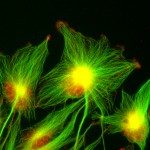Lien vers Pubmed [PMID] – 19766569
Cell 2009 Sep;138(6):1174-83
Motor proteins in the kinesin-8 family depolymerize microtubules in a length-dependent manner that may be crucial for controlling the length of organelles such as the mitotic spindle. We used single-molecule microscopy to understand the mechanism of length-dependent depolymerization by the budding yeast kinesin-8, Kip3p. We found that after binding at a random position on a microtubule and walking to the plus end, an individual Kip3p molecule pauses there until an incoming Kip3p molecule bumps it off. Kip3p dissociation is accompanied by removal of just one or two tubulin dimers (on average). Such a cooperative mechanism leads to a depolymerization rate that is proportional to the flux of motors to the microtubule end and accounts for the length dependence of depolymerization. This type of feedback between length and disassembly may serve as a model for understanding how an ensemble of molecules can measure and control polymer length.

